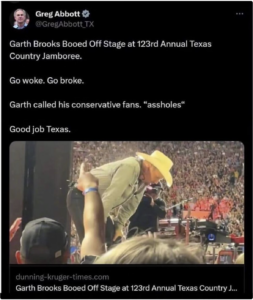A satire publication calling itself The Dunning-Kruger Times has been writing sensational headlines about country music legend Garth Brooks — and too many farmers, ranchers, and other people on social media are falling for it. The most popular piece posted this week claims that Brooks was booed off the stage at the 123rd annual Texas Country Jamboree in Hambriston, and that he implied that his mostly conservative fanbase were “a–holes.”
Neither of those things are true.
Also not true are subsequent articles of a “devastated” fan returning the singer’s signed guitar back to him, or that Toby Keith is backing out of a future performance with Brooks.
Amplifying this mess even more is the fact that Texas’ own governor, Greg Abbott, tweeted a link to the Dunning-Kruger Times post with the words, “Go woke. Go broke.” Abbott has since deleted the tweet, but screenshots circulating on Facebook, Twitter, and Instagram are prevalent.

The social media response to these satire pieces are rooted in statements Brooks made earlier this month during an interview in which he said his Nashville, Tennessee, bar would continue to “serve every brand of beer” — and that includes Bud Light, which has been the target of boycotts by some Republicans after the beer brand entered into a partnership with a transgender influencer.
In the real interview, Brooks said, “Our thing is this: If you come into this house, love one another. If you’re an a–hole, there are plenty of other places on lower Broadway to go.”
What goes unnoticed by many who link to these satire articles and share its screenshots is that the clues are in the name of the “publication” itself: The scientific phenomenon known as the Dunning-Kruger effect occurs when a person’s lack of knowledge and skills in a certain area cause them to overestimate their own competence.
The Dunning-Kruger effect made waves across agriculture in 2019, when research showed that the people who held the most extreme views opposing genetically modified foods (GMOs) thought they knew the most about food science but actually knew the least. It was a manifestation of confirmation bias among a lot of circles. And information-sharing sometimes needs to be accepted with caution today just as it should have been years ago with the anti-GMO activists.
It’s long been clear that there is a lot of negativity, half-truths, and outright lies that seep across the various social media platforms. And — if the source is one you’re unfamiliar with — it may be difficult to immediately identify which websites and links are trustworthy. But if something seems too good to be true and fits too well within what the rumor mill is saying or into a political narrative, agriculturalists need to double check it before sharing it.


